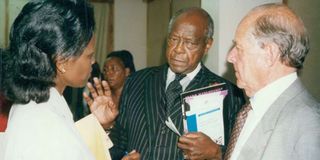Adieu Aronson: Life and times of the Ndung’u Report vice chairman

Mr Michael Aronson (right) with Mr Charles Njonjo and Ms Victoria Katambo.
Of all land experts in Kenya, Michael Aronson was in a class of his own – and when he died last week, he went with many tales about land in the country.
Unknown to many, he was the vice chairman of the Commission of Inquiry into the Illegal/Irregular Allocation of Public Land, which came to be known as the Ndung’u Commission.
In his early years, Mr Aronson oversaw the transfer of land from white settlers to indigenous Kenyans and stayed on as a land registrar working in various districts and with many personalities.
The last time we meet in a home for the elderly in Muthaiga, where he spent his final years, we spent hours as he engaged me on the history of lands and settlements in Kenya. Aronson was a walking library – and even with his fading memory he could recollect dates and people who were instrumental into the land mess in the country.
A former District Officer in Embu during the State of Emergency, Mr Aronson was in charge of the notorious Mwea settlement where thousands of Mau Mau freedom fighters were sent to open the modern day irrigation project.
Apologetic
Later on, an apologetic Aronson would meet with some of the detainees and reconcile.
“He met my father who was detained in Mwea in my house and the two old men hugged. My father forgave him for all that happened,” says Waweru Njora, a Nairobi lawyer who was close to Mr Aronson.
“To me, it was a Mandela moment.”
Among his closest friends in Kenya was Charles Njonjo who was Aronson’s classmate in the UK where the two were taking legal studies. While Njonjo returned and joined the State Law Office, Mr Aronson joined the Ministry of Lands as the Chief Lands Registrar between 1958 and 1966.
It was during this period that various settlement schemes were set up and various personalities tried to corruptly get much. But Mr Aronson did not stay long in the Ministry and would later join Kaplan and Stratton and acted for various settlers who were selling land to the emerging elites. Most of these sales, he would later say, were “forced sales”.
Jomo Kenyatta land
Unknown to many, it was Aronson who acted for Jomo Kenyatta when he purchased the Kahawa Sukari land from Socnaf.
“He told me he drove all the way to Gatundu to have Mzee sign the sale agreement. Kenyatta gave him the cheque after signing the agreement and Aronson drove back and gave it to Socnaf manger, a Mr Michaelides,” Mr Njora says.
It was Mr Aronson who helped the two American investors, John Saul and Elliot Miller to sell their ruby mine in Tsavo to Johnstone Muthama after the Kenyatta government ordered for their deportation – thus triggering an international uproar. It was later claimed that the Kenyatta family had interest in the mines.
Refused British citizenship
Although Mr Aronson’s father had come from South Africa, he was born in Kenya on October 5, 1926, and always regarded himself as a Kenyan. He refused to take up British citizenship and always carried a Kenyan passport. He always had to apply for a visitor’s visa to go to London.
During the Second World War, Mr Aronson was enlisted into the air force with his older brother – now buried at the Uhuru Highway cemetery in Nairobi.
But it was in land matters that he was well known in legal circles and he was a member of both the Njonjo Commission on Land and also part of the team that compiled the Ndung’u Report.
Mr Aronson was always frustrated that most of the recommendations had not been worked on but he was always happy that he had done his part.
In 2016, and as he turned 90, Mr Aronson called a small group of acquaintances, most of them elite lawyers, for a celebration at the Old East India Club in London. Njora and his wife were the only black couple.
“How do you fit in this mix?” Margaret Njonjo asked Njora.
And that is how Mr Aronson freely mixed with many other Kenyans.





